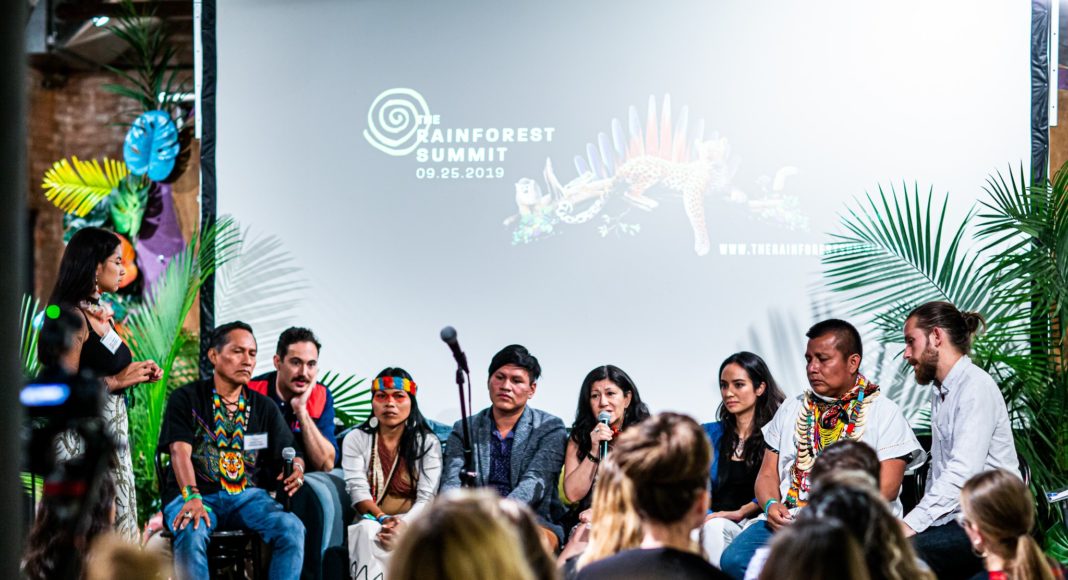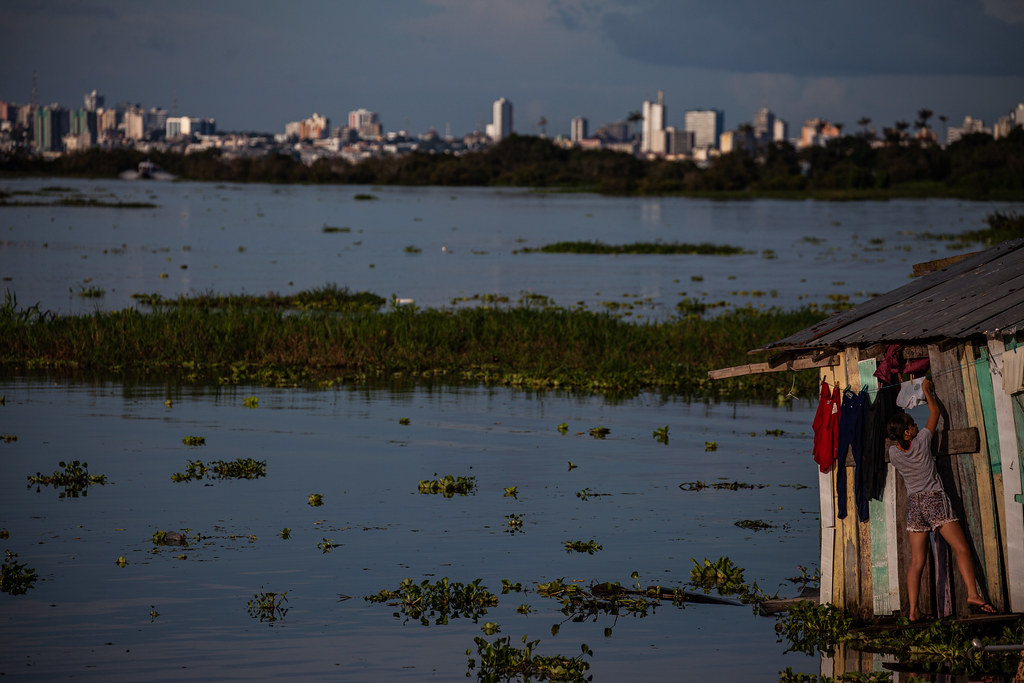“A number of indigenous leaders from the Amazon were at the forefront of climate action events in New York 19-28 September 2019. The protests, rallies and symposia were organised around the UN Climate Summit on 23 September 2019, within the 74th Session of the UN General Assembly, September 17 – 30, 2019. Linda Etchart was there for LAB and interviewed a number of the leaders. This is the first of three posts in a new LAB blog series on Climate Change.
“We know that indigenous people around the world are protecting the rainforest, but our rights are being denied to us. By protecting the forest, we protect the planet. Taking the environment is taking our lives. Heads of government are rushing to destroy the environment to meet the demands of capital, of the economy. We are deeply concerned at the policies of the Brazilian government.” These are the words of Sônia Guajajara, of the Association of Brazil’s Indigenous Peoples (APIB).
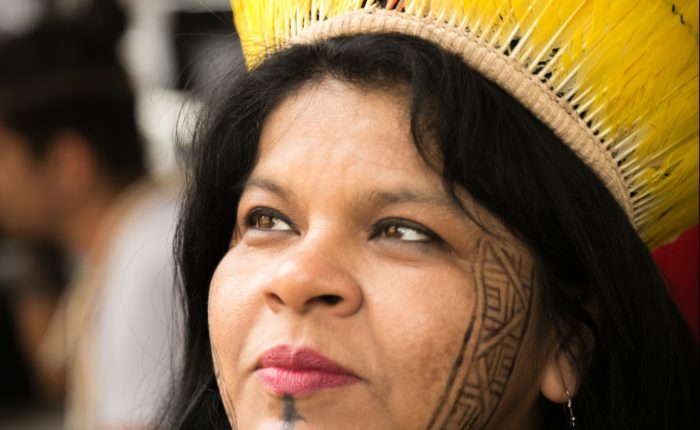
Sonia and a number of indigenous leaders from the Amazon were at the forefront of climate action events in New York 19-28 September 2019. The protests, rallies and symposia were organised around the UN Climate Action Summit that took place alongside the annual UN General Assembly attended by world leaders, including climate-change denier President Jair Bolsonaro of Brazil.
Despite the world youth climate strike on 20 September, in which more than 7 million people took to the streets, there was little progress among world leaders within the confines of the UN itself. The leaders of the world’s largest greenhouse gas emitting nations failed to make serious inroads into taking action to keep the average global temperature increase to below 1.5% above pre-industrial levels by the end of the century. This was at a time in history when the Amazonian rainforest was burning at unprecedented levels. At the UN Climate Summit on 23 September, the government of the world’s largest greenhouse gas emitter, China, failed to make further efforts to reducing carbon emissions. The representatives of the second largestemitting country, the USA, were unable to honour existing commitments. The USA was on course to withdraw from the Paris agreement, with its agents remaining silent. The European Union made no new commitments.
The UN Secretariat´s Climate Summit took place within the timeframe of the Climate Group´s Climate Week hosted by the UN and the City of New York. The official events involved government ministers, governors, mayors and investors, focussing on the role of the private sector, with sponsorship by McKinsey & Co, and Bank of America as opening sponsors; AT&T, Unilever, Estée Lauder, and International Copper Association, among Platinum sponsors; PWC, Johnson & Johnson, among gold sponsors, and IKEA and BT among silver sponsors. Non-official events were hosted by a range of university departments and international NGOs.
Civil society protests that were centred around the burning of the rainforests in Brazil were joined or initiated by indigenous leaders, many of whom came from the Amazon region. Sônia Guajajara, of the Association of Brazil’s Indigenous Peoples (APIB), was the lead speaker at an Emergency Rainforest Summit in Williamsburg, Brooklyn, on 25 September, organised and supported by environmental NGOs including Amazonwatch and Amazon Frontlines. The protests and rallies were all critical of the region’s governments.
The Condor & The Eagle had its world première at the Woodstock Film Festival, New York, on 4 October 2019.
Brazil: indigenous rights and the environment under attack
Stressing the indigenous representatives’ acute concern, Sônia Guajajara stated “Bolsonaro’s speech … at the UN General Assembly is a manifestation of this policy. His speech affected us directly, the indigenous people, but should be of concern to all of society… His speech was deeply aggressive, deeply violent … He was eulogising the military dictatorship when 8,000 indigenous people were murdered. He compared us, the indigenous people, to animals in caves.”
In his speech “Bolsonaro tried to delegitimise the great indigenous leader Chief Raoni [Metuktire of the Kayapó tribe]. Bolsonaro tried to show concern for indigenous people by bringing an indigenous woman with him to the UN who had no authorisation from her own people to represent them. She had the audacity to use a headdress: this shows the level of his cynicism.”
“His discourse has provoked a rise in conflicts in indigenous territories, policies that have led to a rise in the number of murders of indigenous people, a rise in persecution and criminalisation of indigenous peoples. The discourse of hate and violence incentivises attacks. His policies of freeing up gun ownership has led to a rise in conflict. We are standing up and fighting this genocidal policy. This cannot just be our responsibility. The Amazon is a global patrimony so we all need to be involved in its protection. Bolsonaro said in his speech that the Amazon belongs to Brazil and that the idea of world patrimony undermines Brazil’s sovereignty, but he is a threat to Brazil’s sovereignty; he is a threat to our planet.”
“We shall fight for the title to our territory. It is understood that 13 per cent of Brazil is indigenous land, but 46 per cent of our land is in the hands of private landlords, primarily for agribusiness. The indigenous lands, compared with other regions, are the best preserved lands in Brazil. It is precisely where we live, the land that we defend with our lives that guarantees the water you have and the air that you breathe.”
“Government policy is authorising the pollution of water, the exclusion of our people from our territories, the poisoning of our environment. Not only do we have the largest tropical forest in the world, we have the largest reserve of fresh water in the world. All of this is under threat from the private sector. Companies such as Nestlé and Coca Cola are trying to negotiate to purchase the largest aquifer in Brazil. Because of this, those of us who fight for our land are being threatened.”
“It is important that people understand the importance of demarcation, of titling, of land. It is important that the international community pressure the Brazilian government to demarcate indigenous territories. We must pressure our own lawmakers, our own legislators to recognise the crime of ecocide as a crime against humanity.”
“It is important that we demand of our politicians that they demand that private companies have policies that respect human rights and respect the environment.
“The struggle for forests is a political struggle that is costly for us. Indigenous peoples are the frontline defenders who are dying… We have to pressure our heads of state to recognise that ecocide is a crime against humanity.”
“We all need to search to understand our role in the struggle. We are still few to take care of the lives of so many people. We all need to stand up in defence of mother earth. This struggle is not one of individuals alone. It needs to continue for generations. It requires ecological and political understanding.”
“We need to use the speed of information, for example, the internet, to express our concern, and our reaction in defence of the environment. We need to demand a worldwide struggle against this predatory form of development, a model of development that benefits no one except the large corporations. Today in Brazil, our fight continues against deforestation and large forest fires. Against miners and against hydroelectric dams. We are fighting for a societal model that involves all people and that respects the environment. We are fighting for a society where we have the right to live and not just to survive. We are calling on all people to help us to build a new societal project based on solidarity, fraternity and respect among all peoples. The fight for mother earth is the mother of all fights. Join us: I want to fight, but I want to fight with you.”
Ecuador: no more oil from the Amazon
Sônia Guajajara was joined by Nemonte Nenquimo of the Huaorani people of Pastaza province, who led a campaign of resistance to oil exploration in Huaorani territory. The Huaorani lawsuit in the Ecuadorian courts led to three judges ruling on 26 April 2019 that the decision to allow oil exploration on Huaorani territory had been made without Free, Prior and Informed Consent (FPIC), obligatory under Ecuadorian law. It was deemed, therefore, that their territory could not be included in an oil auction. It was a rare victory for indigenous people in resisting oil and mineral extraction.
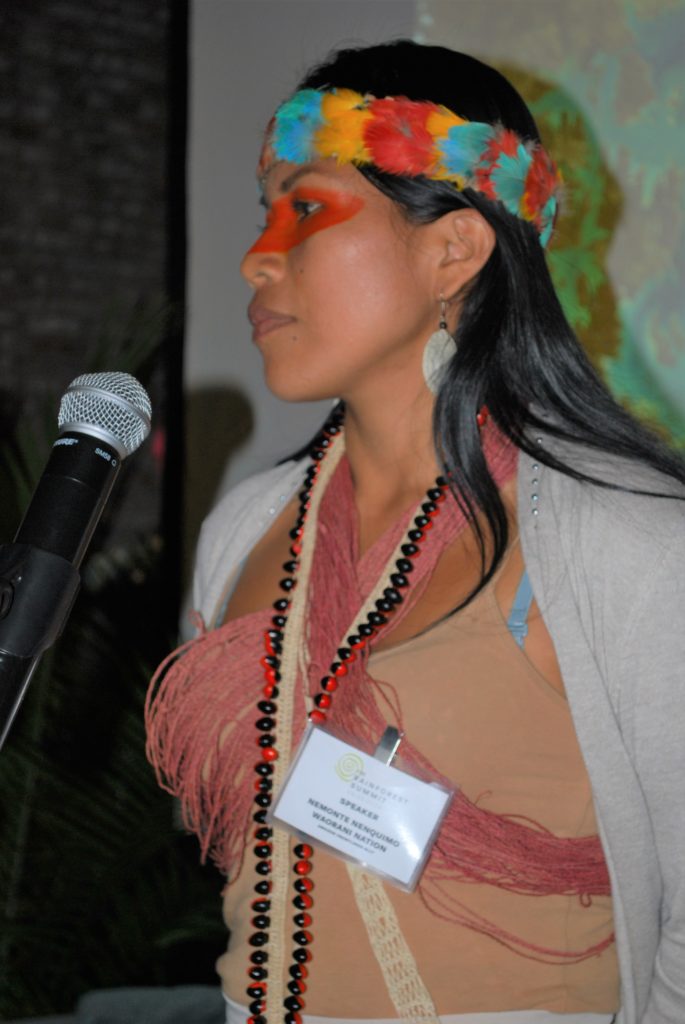
Nemonte Nenquimo: “I am an indigenous woman of the Amazonian rainforest. It has been hard for me to come such a long way to New York. They have taken the oil out of my territory to build these huge buildings for you. For you to have these privileges, we in the Amazon are suffering. For us, the Amazon is our market, our pharmacy, our everything. You talk about climate change, but oil extraction is destroying our forest. They are cutting down our trees. Now is the moment to resist and we are asking for your help. I call on you to work with us and say, ‘Enough! –No more oil from the Amazon.’ This form of development will kill the animals. If the animals die, we will die too. We are the guardians of the forest, we protect the forest. You must stand with us in this fight for our children and for the future. We will be the ones to die first, and then it will be your turn.”
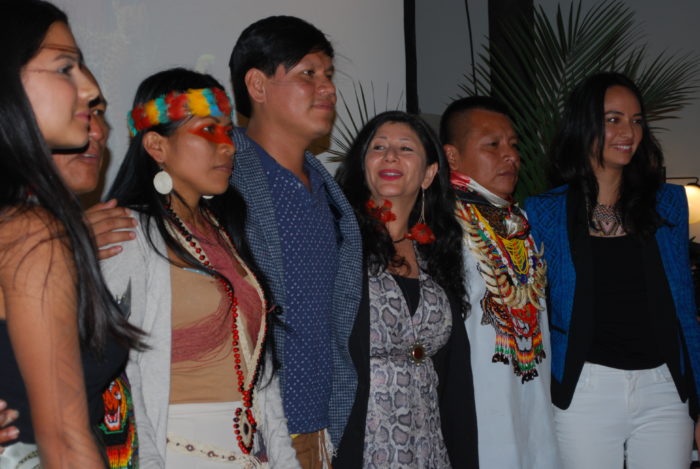
The Rainforest Summit concluded with a panel chaired by Helena Gualinga of the Sarayaku Kichwa community, who live on the Bobonaza river, a tributary of the Amazon. Among the panel participants were Leo Cerda, Kichwa from Tena, Napo province, Ecuador, and Don William Llerena Murayar of Peru. Helena Gualinga ended the summit by asking the New York audience to be allies for the future and to stand by the indigenous peoples of the Amazon: “My future depends on this alliance between these two worlds” – the world of the city and the world of the rainforest.
Author’s Note: Some extracts of the speeches by indigenous representatives that are reproduced here will appear in my forthcoming article on indigenous women activists in the Americas in the journal City: Critical analysis of urban trends, culture, theory, policy, action. The translations are mine.

